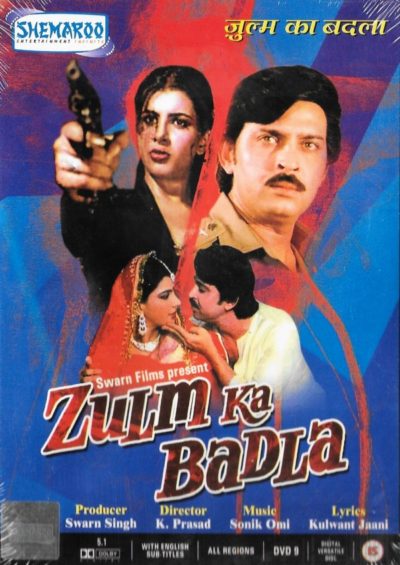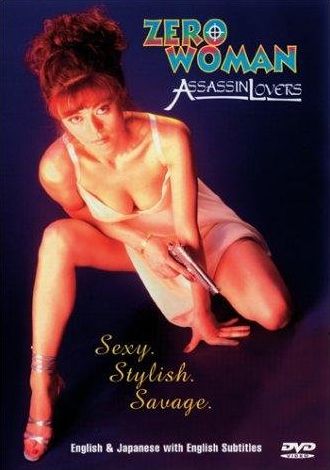★★★
“The family that slays together…”
 In recent years, the gap in cinema between Bollywood and Hollywood has closed dramatically. The likes of Indian blockbusters such as RRR (technically Tollywood rather than Bollywood) can stand, in terms of technical competence, beside their American equivalents. It’s mostly due to a dramatic improvement from Asia, because it wasn’t always the case, as we see when we go back to the mid-eighties for this slice of vengeance served cold. It looks pretty rough if you compare it to what Hollywood was making at the time, and in many ways feels like it’s about twenty years older than it is. I still found it more watchable than I expected, but then, I’m somewhat used to the style of Indian cinema. Newcomers might find this a bumpy ride.
In recent years, the gap in cinema between Bollywood and Hollywood has closed dramatically. The likes of Indian blockbusters such as RRR (technically Tollywood rather than Bollywood) can stand, in terms of technical competence, beside their American equivalents. It’s mostly due to a dramatic improvement from Asia, because it wasn’t always the case, as we see when we go back to the mid-eighties for this slice of vengeance served cold. It looks pretty rough if you compare it to what Hollywood was making at the time, and in many ways feels like it’s about twenty years older than it is. I still found it more watchable than I expected, but then, I’m somewhat used to the style of Indian cinema. Newcomers might find this a bumpy ride.
It begin with an attack on military official Colonel Rajesh, in which he and his wife are killed by JK (Kapoor) and his men. Their son is missing, presumed dead, leaving young daughter Geeta (Raj) the only survivor. She is adopted by Rajesh’s friend, Inspector Verma, and grows up in his house, eventually marrying the cop’s son, Anil (Rakesh), who has followed his father into the police force. Geeta has learned to take care of herself, as we see when she handily disposes of some ruffians on the beach. But it’s only when she accidentally sees a photograph given to her husband, that her long-repressed memories of the attack surface, and an insatiable thirst for revenge is born.
On the action level, let’s be honest, this is a bit crap, with Geeta doing little more than semi-competent kicking, but being made to look like she is flying through the air, in a way a cheap seventies chop-socky movie would reject as poorly executed. [It seems Geeta is actually pregnant at this point too!] However, this is made up for by some quite intense drama, not least that her brother survived, albeit with amnesia and is now one of JK’s lieutenants. He feels a bond to Geeta, though can’t quite figure out why. There are the inevitable musical numbers, too; most are at least semi-integrated into the plot, Geeta using her seductive skills to get close to her targets. Though might I suggest that, when a woman sings a song at you whose lyrics include the lines. “Now I’ve decided either to kill you or die myself,” that caution might be the best approach.
There are some moments which definitely stretch disbelief. After Geeta is forced on the run, she disguises herself as a nun, and it appears that slapping a wimple on your head and wearing glasses is an impenetrable disguise, which neither her foster father nor husband can penetrate. However, at least they don’t try and pass the thoroughly attractive Raj off as a man (I’m talking to certain Hong Kong films here!). Her brother helps, by breaking the final target out of prison, so they can unite and take revenge together. Which is nice. Naturally, they’re not allowed to get away with it in eighties Bollywood movies, making for a rather bittersweet ending. If it’s all more than a little shaky around the edges, its heart is both large and in the right place.
Dir: Chand and K. Prasad
Star: Anita Raj, Danny Denzongpa, Rakesh Roshan, Shakti Kapoor





 Zemlya is a gigantic closed city, in the middle of the Arctic tundra, its ten million inhabitants entirely cut off from the outside world. Indeed, there may not be an outside world: no-one knows, for the authorities hunt down and terminate anyone who tries to leave. One of their hunters is Kate
Zemlya is a gigantic closed city, in the middle of the Arctic tundra, its ten million inhabitants entirely cut off from the outside world. Indeed, there may not be an outside world: no-one knows, for the authorities hunt down and terminate anyone who tries to leave. One of their hunters is Kate  It’s not often that a film cost less to make, than the television set on which I watched it. But it appears this was the case here, with the budget reportedly coming in at five hundred pounds. No, there’s not a “thousand” missing from that. £500. What you get is probably not too far from what you would expect for that – some of the aerial photography and locations do appear to represent good value for money. Budget isn’t the real issue here though. This British film’s main problem is the drastic shift in story for the final third, when it suddenly morphs, for no reason, from a SF/thriller, into a full-on zombie apocalypse which the makers have neither the budget nor the talent to depict.
It’s not often that a film cost less to make, than the television set on which I watched it. But it appears this was the case here, with the budget reportedly coming in at five hundred pounds. No, there’s not a “thousand” missing from that. £500. What you get is probably not too far from what you would expect for that – some of the aerial photography and locations do appear to represent good value for money. Budget isn’t the real issue here though. This British film’s main problem is the drastic shift in story for the final third, when it suddenly morphs, for no reason, from a SF/thriller, into a full-on zombie apocalypse which the makers have neither the budget nor the talent to depict. I’m not kidding. Director Deodato is best known as the man behind one of the most notorious of all “video nasties,” a film which created such a furore, he had to produce the actors to convince the Italian courts he hadn’t killed them. But in almost fifty years of work (he’s still active today), Deodato has done everything from spaghetti Westerns to science-fiction. And more than a decade before Holocaust, back in 1968, he directed this bawdy action-comedy.
I’m not kidding. Director Deodato is best known as the man behind one of the most notorious of all “video nasties,” a film which created such a furore, he had to produce the actors to convince the Italian courts he hadn’t killed them. But in almost fifty years of work (he’s still active today), Deodato has done everything from spaghetti Westerns to science-fiction. And more than a decade before Holocaust, back in 1968, he directed this bawdy action-comedy.
 The main mission given to Rie (Shiratori this time) is a little bit different, from her usual, straight-forward assassinations. Instead, she’s given the job of protecting a witness. Nana (Matsuda), the disgruntled mistress of an organ-trafficking ring, who has had enough and agreed to co-operate with the police. Rie is part of the protection detail, but soon finds out that the gangsters, under ever-so strange boss Kaneda (Nogami) with his transvestite tendencies, are not going to sit back and wait for Nana to take the witness stand. Oddly, the cops let Nana stay in her own apartment, perhaps figuring that’s the last place her former lover would look. but when that is unsurprisingly stormed, Rie takes the target back to the operative’s flat, where they hang out, exchanging small talk – that’s mostly Nana, of course, since Rie is about as talkative as the enormous pet fish she has in a tank, and to which she feeds goldfish.
The main mission given to Rie (Shiratori this time) is a little bit different, from her usual, straight-forward assassinations. Instead, she’s given the job of protecting a witness. Nana (Matsuda), the disgruntled mistress of an organ-trafficking ring, who has had enough and agreed to co-operate with the police. Rie is part of the protection detail, but soon finds out that the gangsters, under ever-so strange boss Kaneda (Nogami) with his transvestite tendencies, are not going to sit back and wait for Nana to take the witness stand. Oddly, the cops let Nana stay in her own apartment, perhaps figuring that’s the last place her former lover would look. but when that is unsurprisingly stormed, Rie takes the target back to the operative’s flat, where they hang out, exchanging small talk – that’s mostly Nana, of course, since Rie is about as talkative as the enormous pet fish she has in a tank, and to which she feeds goldfish. If ever I become an evil overlord, I will ensure my minions’ idea of security does not involve walking slowly in the open, towards an attacker, while firing wide of them from a range no greater than a slightly oversize dinner-table. That’s the first thing we take from this, which begins with a thoroughly implausible scene where Rei (Ono, who had been a part of 90’s J-pop group CoCo) manages to drown her target, a German industrialist, despite him being roughly twice her size, and without anyone in or around the swimming-pool noticing anything. She then climbs out, pulling a gun from who knows where, kills bodyguards who’d fail the Imperial Stormtrooper accuracy exam, and abseils down the side of the building to escape. That sets the tone for much of what follows, combining a reunion with someone from her past, a blossoming relationship with a chef, and her boss’s traditional surly reluctance to allow anything as banal as “personal happiness” to distract his #1 killer from her work.
If ever I become an evil overlord, I will ensure my minions’ idea of security does not involve walking slowly in the open, towards an attacker, while firing wide of them from a range no greater than a slightly oversize dinner-table. That’s the first thing we take from this, which begins with a thoroughly implausible scene where Rei (Ono, who had been a part of 90’s J-pop group CoCo) manages to drown her target, a German industrialist, despite him being roughly twice her size, and without anyone in or around the swimming-pool noticing anything. She then climbs out, pulling a gun from who knows where, kills bodyguards who’d fail the Imperial Stormtrooper accuracy exam, and abseils down the side of the building to escape. That sets the tone for much of what follows, combining a reunion with someone from her past, a blossoming relationship with a chef, and her boss’s traditional surly reluctance to allow anything as banal as “personal happiness” to distract his #1 killer from her work. After the genuinely impressive bleakness of Assassin Lovers, the series comes crashing back to earth with a splat like a rotten tomato for this entry, which fizzles out early on, and then manages to lumber on for another 45 minutes. Rei (Tachihara) spends her time between missions hanging out at a gay bar, and rescues one of the rent boys, Mitsusu (Kitagawa), who ply their trade there after a vicious assault – accompanied, it has to be said, by the least appropriate music in the history of cinematic homosexual rape. He ends up moving in with her, to the latest in a series of unfurnished apartments provided by Section Zero, and the two damaged individuals start creating a life, of sorts, for themselves. However, there’s a serial killer, apparently with a deep hatred of men, operating in the area, and Rei is given the mission of tracking down and eliminating the psycho.
After the genuinely impressive bleakness of Assassin Lovers, the series comes crashing back to earth with a splat like a rotten tomato for this entry, which fizzles out early on, and then manages to lumber on for another 45 minutes. Rei (Tachihara) spends her time between missions hanging out at a gay bar, and rescues one of the rent boys, Mitsusu (Kitagawa), who ply their trade there after a vicious assault – accompanied, it has to be said, by the least appropriate music in the history of cinematic homosexual rape. He ends up moving in with her, to the latest in a series of unfurnished apartments provided by Section Zero, and the two damaged individuals start creating a life, of sorts, for themselves. However, there’s a serial killer, apparently with a deep hatred of men, operating in the area, and Rei is given the mission of tracking down and eliminating the psycho.

 Confusingly titled in the West, without any indication it wasn’t the first of the rebooted franchise, this perhaps explains why there’s little or no explanation of… Well, anything, really. What is Section Zero? Who is Rei? Where did she come from? “Never mind about that,” seems to be the film’s attitude, “Here are Natsuki Ozawa’s breasts to distract you from such trifles.” That’s particularly the case early on, when it seems Rei is unable to go five minutes without showing them off, whether it’s through being molested, becoming inescapably randy or simply taking a soapy shower (to wash off the blood after a kill, so I guess it’s a shower necessary to the plot – it also replays the intruder shower scene from its predecessor, with a different ending).
Confusingly titled in the West, without any indication it wasn’t the first of the rebooted franchise, this perhaps explains why there’s little or no explanation of… Well, anything, really. What is Section Zero? Who is Rei? Where did she come from? “Never mind about that,” seems to be the film’s attitude, “Here are Natsuki Ozawa’s breasts to distract you from such trifles.” That’s particularly the case early on, when it seems Rei is unable to go five minutes without showing them off, whether it’s through being molested, becoming inescapably randy or simply taking a soapy shower (to wash off the blood after a kill, so I guess it’s a shower necessary to the plot – it also replays the intruder shower scene from its predecessor, with a different ending).